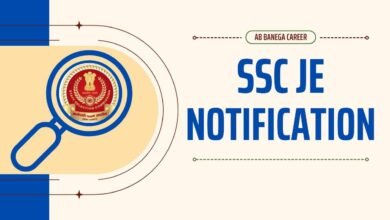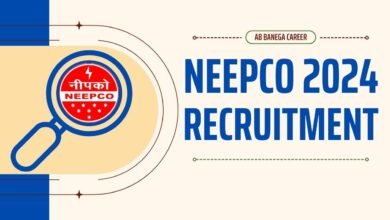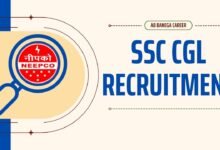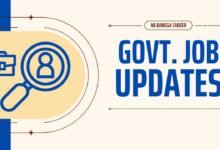Top 10 Government Exams after Graduation
Here is the list of all the top government exams to target after graduation is over. The table has data on exam name, posts and the salary range respectively. The exams pave a way to different posts and the salary for them varies accordingly. Getting a govt. job is a dream of millions of aspirants in India. Hence, the competition is tough. One should explore the syllabus, exam pattern, detailed eligibility, level of difficulty and job profiles before deciding the exam to crack. The aspirants preparing for govt exams like UPSC Civil Services can definitely appear for State PSCs. Similarly, candidates preparing for IBPS PO can appear for SBI PO and son on.
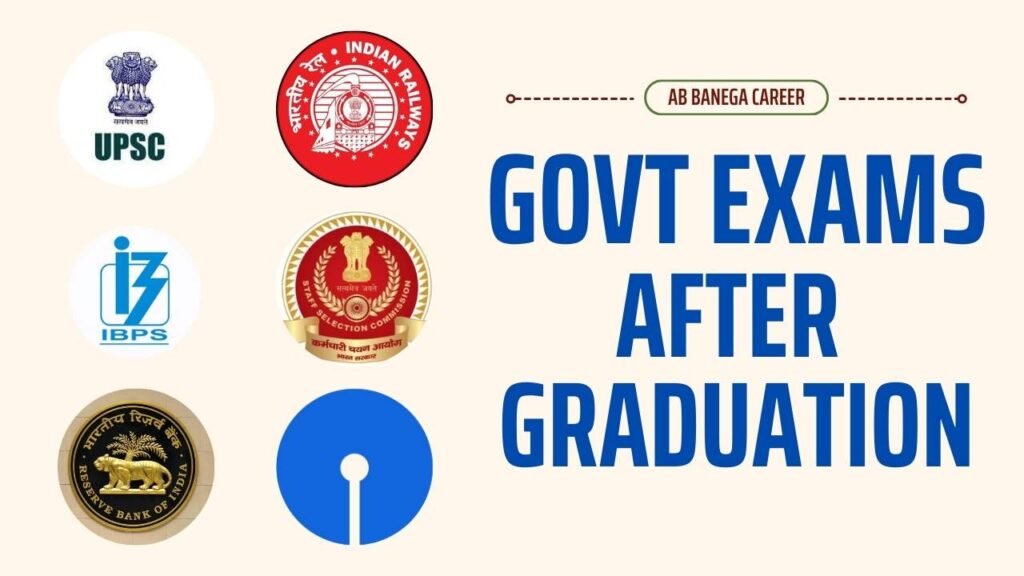
Govt Exams after Graduation
| Exam | Posts | Salary Range |
| UPSC Civil Services Examination (UPSC CSE) | IAS, IPS, IFS, IRS, etc. | Rs. 56,100 – Rs. 2,50,000 |
| SSC Combined Graduate Level (SSC CGL) | Group B & C posts in various ministries and departments | Rs. 25,500 – Rs. 1,42,400 |
| IBPS Probationary Officer (IBPS PO) | Probationary Officer in Public Sector Banks | Rs. 37,360 – Rs. 47,000 |
| IBPS Clerk | Clerk in Public Sector Banks | Rs. 11,765 – Rs. 31,540 |
| RBI Grade B Officer | Grade B Officer in Reserve Bank of India | Rs. 35,150 – Rs. 62,400 |
| SBI PO | Probationary Officer in State Bank of India | Rs. 37,360 – Rs. 47,000 |
| SBI Clerk | Junior Associate in State Bank of India | Rs. 13,075 – Rs. 31,450 |
| LIC AAO | Assistant Administrative Officer in Life Insurance Corporation | Rs. 32,795 – Rs. 62,315 |
| Railway NTPC Exam | Non-Technical Popular Categories in Indian Railways | Rs. 18,000 – Rs. 44,900 |
| RRB Group D | Various Group D posts in Indian Railways | Rs. 18,000 – Rs. 25,000 |
| SSC Stenographer | Stenographer in various government departments | Rs. 25,500 – Rs. 1,42,400 |
| EPFO SSA | Social Security Assistant in Employees’ Provident Fund Organisation | Rs. 25,500 – Rs. 81,100 |
| FCI Assistant Grade-III | Assistant Grade III in Food Corporation of India | Rs. 22,000 – Rs. 80,000 |
| Intelligence Bureau ACIO | Assistant Central Intelligence Officer in Intelligence Bureau | Rs. 44,900 – Rs. 1,42,400 |
| ISRO Scientist/Engineer | Scientist/Engineer in Indian Space Research Organisation | Rs. 56,100 – Rs. 1,77,500 |
| DRDO CEPTAM | Technician, Stenographer, Administrative Assistant, etc. in Defence Research & Development Organisation | Rs. 19,900 – Rs. 81,100 |
| State PSC Exams (e.g., UPPSC, BPSC) | Various administrative roles at the state level | Varies by state; typically follows pay scales |
| SSC CHSL (Combined Higher Secondary Level) | Lower Division Clerk (LDC), Data Entry Operator (DEO), Postal/Sorting Assistant | Rs. 19,900 – Rs. 63,200 |
| UPSSSC Junior Assistant | Junior Assistant in various state departments | Rs. 21,700 – Rs. 69,100 |
| CTET (Central Teacher Eligibility Test) | Primary and Upper Primary Level Teachers | Varies by state and school |
| IB ACIO (Intelligence Bureau Assistant Central Intelligence Officer) | Assistant Central Intelligence Officer | Rs. 44,900 – Rs. 1,42,400 |
Posts under UPSC Civil Services Examination (CSE)
1. Indian Administrative Service (IAS)
2. Indian Police Service (IPS)
3. Indian Foreign Service (IFS)
4. Indian Revenue Service (IRS-IT and IRS-C&CE)
5. Indian Audit and Accounts Service (IAAS)
6. Indian Information Service (IIS)
7. Indian Civil Accounts Service (ICAS)
8. Indian Railway Traffic Service (IRTS)
9. Indian Railway Accounts Service (IRAS)
10. Indian Railway Personnel Service (IRPS)
11. Indian Defence Estates Service (IDES)
12. Indian Ordnance Factories Service (IOFS)
13. Indian Postal Service (IPoS)
14. Indian Trade Service (ITS)
15. Indian Corporate Law Service (ICLS)
16. Indian Defence Accounts Service (IDAS)
17. Indian P&T Accounts and Finance Service (IP&TAFS)
18. Delhi, Andaman and Nicobar Islands, Lakshadweep, Daman and Diu, Dadra and Nagar Haveli Civil Service (DANICS)
19. Delhi, Andaman and Nicobar Islands, Lakshadweep, Daman and Diu, Dadra and Nagar Haveli Police Service (DANIPS)
Posts under IBPS (Institute of Banking Personnel Selection)
1. IBPS Probationary Officer (PO)
2. IBPS Specialist Officer (SO):
– IT Officer
– Agricultural Field Officer
– Rajbhasha Adhikari
– Law Officer
– HR/Personnel Officer
– Marketing Officer
3. IBPS Clerk
4. IBPS Regional Rural Banks (RRBs):
– Officer Scale I (Assistant Manager), II (Manager – General Banking Officer, IT Officer, Chartered Accountant, Law Officer, Treasury Manager, Marketing Officer, Agricultural Officer), III (Senior Manager)
– Office Assistant (Multipurpose)
Posts under SSC (Staff Selection Commission)
1. SSC Combined Graduate Level Examination (CGL):
– Assistant Audit Officer (AAO)
– Assistant Accounts Officer (AAO)
– Assistant Section Officer (ASO)
– Inspector of Income Tax
– Inspector (Central Excise)
– Inspector (Preventive Officer)
– Inspector (Examiner)
– Assistant Enforcement Officer (AEO)
– Sub Inspector (CBI)
– Inspector of Posts
– Divisional Accountant
– Junior Statistical Officer (JSO)
– Statistical Investigator Grade II
– Auditor
– Accountant/Junior Accountant
– Senior Secretariat Assistant/Upper Division Clerks (UDC)
– Tax Assistant
2. SSC Combined Higher Secondary Level Examination (CHSL):
– Lower Divisional Clerk (LDC)/Junior Secretariat Assistant (JSA)
– Postal Assistant/Sorting Assistant (PA/SA)
– Data Entry Operator (DEO)
3. SSC Multi-Tasking Staff (MTS)
4. SSC Junior Engineer (JE)
5. SSC Stenographer (Grade C and D)
6. SSC Central Police Organization (CPO)
– Sub Inspector (SI) in CAPFs
– SI in Delhi Police
7. SSC GD Constable
Posts under SBI (State Bank of India)
1. SBI Probationary Officer (PO)
2. SBI Clerk (Junior Associates)
3. SBI Specialist Officer (SO):
– IT Officer
– Law Officer
– HR/Personnel Officer
– Marketing Officer
– Deputy Manager (Internal Audit)
Posts under RBI (Reserve Bank of India)
1. RBI Grade B Officer
2. RBI Assistant
Syllabus for Govt Exam after Graduation
The general syllabus for government exams varies based on the specific exam, but there are common themes and subjects that frequently appear across many of these exams. The following information will help you:
1. General Awareness/General Knowledge
-
- Current Affairs: National and international events, sports, awards, appointments, obituaries.
- History: Ancient, Medieval, and Modern History of India.
- Geography: Physical, social, and economic geography of India and the world.
- Polity: Indian Constitution, political system, Panchayati Raj, public policy, rights issues, etc.
- Economy: Indian economy, economic and social development, poverty, inclusion, demographics, budget, and economic survey.
- General Science: Basic concepts of Physics, Chemistry, Biology, and Environmental Science.
- Miscellaneous: Static GK, important organizations, important dates, etc.
2. Quantitative Aptitude/Mathematics
-
- Arithmetic: Percentages, profit and loss, discount, simple and compound interest, ratio and proportion, averages, mixtures and allegations.
- Algebra: Basic algebraic expressions, equations, inequalities.
- Geometry: Basic concepts of geometry, properties of shapes, mensuration.
- Trigonometry: Basic trigonometric ratios, heights and distances.
- Statistics: Data interpretation, measures of central tendency (mean, median, mode), measures of dispersion (variance, standard deviation).
- Number System: Fundamental concepts of numbers, divisibility rules, LCM, HCF, prime numbers.
3. Reasoning Ability/Logical Reasoning
-
- Verbal Reasoning: Analogy, classification, series, coding-decoding, blood relations, direction sense test, logical sequence of words, arithmetical reasoning.
- Non-Verbal Reasoning: Pattern recognition, mirror images, water images, paper folding and cutting, figure series, embedded figures.
- Analytical Reasoning: Puzzles, seating arrangements (linear and circular), syllogisms, Venn diagrams, statement and assumptions, statement and arguments.
4. English Language
-
- Grammar: Parts of speech, tenses, subject-verb agreement, articles, prepositions, conjunctions, direct and indirect speech, active and passive voice.
- Vocabulary: Synonyms, antonyms, one-word substitution, idioms and phrases.
- Comprehension: Reading comprehension passages, cloze test, para jumbles.
- Writing Skills: Essay writing, precis writing, letter writing (for descriptive papers).
5. Professional Knowledge (for Specialist Exams)
-
- Specific to Job Role: IT, HR, Law, Agriculture, Marketing, etc., depending on the specific requirements of the job.
6. General Studies (for UPSC and State PCS)
-
- Paper I (Preliminary Exam): General Awareness, History, Geography, Polity, Economy, General Science, Environment and Ecology, Current Affairs.
- Paper II (CSAT): Comprehension, Interpersonal skills, Logical reasoning and analytical ability, Decision-making and problem-solving, General mental ability, Basic numeracy.
7. Descriptive Papers
-
- Essay Writing: Topics related to current events, social issues, national and international importance.
- Letter/Application Writing: Formats and content based on formal and informal requirements.
- Precis Writing: Summarizing passages to test comprehension and concise writing skills.
Specific Exam Syllabus
-
- UPSC CSE Mains: Detailed papers on Essay, General Studies (divided into multiple papers covering different aspects like history, culture, geography, polity, international relations, technology, environment, ethics, etc.), and Optional Subjects.
- Bank Exams (IBPS, SBI): Additional focus on Banking Awareness, Financial Awareness.
- SSC Exams: Emphasis on Arithmetic, English Language, Reasoning, and General Awareness.
- RBI Exams: Includes Economic and Social Issues, Finance and Management for Grade B.
Exam Pattern for Govt Exam after Graduation
Most of the govt exams after graduation have a similar pattern to filter students in 2 rounds – Prelims, Mains. Few of them will go a step further with Personal Interview like UPSC and State PCSs. SSC CGL pattern consists of Tier-I (Objective), Tier-II (Objective), Tier-III (Descriptive) and Tier-IV (Skill Test for some posts). IBPS Clerk has Prelims(Objective), Mains (Objective). RBI Grade B Officer has Phase-I (Objective), Phase-II (Objective + Descriptive) and Interview. UPSC CDS has written exam (English, Maths, Science/History/Geography) and SSB Interview.
Govt Exams after Graduation in Maharashtra
MPSC is the major government exam that aspirants target in Maharashtra.
| Exam | Conducted By | Posts | Salary Range |
|---|---|---|---|
| MPSC (Maharashtra Public Service Commission) Exams | MPSC | Deputy Collector, Sub Divisional Officer, Police Sub-Inspector, Assistant Section Officer, etc. | Rs. 40,000 – Rs. 1,80,000 |
| Maharashtra TET (Teacher Eligibility Test) | MahaTET | Teacher Positions in Maharashtra Schools | Rs. 40,000 – Rs. 1,40,000 |
| PSI (Police Sub-Inspector) | Maharashtra Police | Police Sub-Inspector | Rs. 40,000 – Rs. 1,20,000 |
| Maharashtra Forest Service Exam | MPSC | Range Forest Officer, Assistant Conservator of Forests, etc. | Rs. 40,000 – Rs. 1,50,000 |
| Maharashtra Accounts Service Exam | MPSC | Assistant Accounts Officer, Deputy Director of Accounts, etc. | Rs. 40,000 – Rs. 1,40,000 |
| Maharashtra Civil Service Exam | MPSC | Nayab Tehsildar, Block Development Officer, etc. | Rs. 40,000 – Rs. 1,30,000 |
| MahaDISCOM (Maharashtra State Power Distribution Company Limited) | MahaDISCOM | Engineer, Assistant Manager, etc. | Rs. 40,000 – Rs. 1,00,000 |
| Maharashtra State Co-operative Bank Exams | MSCB | Officer Trainee, Manager, etc. | Rs. 40,000 – Rs. 80,000 |
| Assistant Public Prosecutor Exam | Maharashtra Government | Assistant Public Prosecutor | Rs. 40,000 – Rs. 1,00,000 |
Must Explore
How to crack Group Discussion?
Govt Exams after Graduation
Graduation marks a pivotal milestone in one’s academic journey. For many students in India, this is the time to contemplate their career paths. A popular choice for graduates is to pursue government jobs due to the stability, security, and prestige they offer. With various government exam after graduation, students can align their aspirations with their skill sets and interests. This article provides a comprehensive guide on government exams to target after graduation in 2024, helping you navigate the best options and prepare for a successful career in public service.
Why Consider Government Jobs After Graduation?
Government jobs in India are renowned for offering job security, substantial benefits, and a sense of serving the nation. Graduates from different fields—arts, commerce, science, and engineering—can apply for government roles through various competitive exams. Here are the top reasons why a government job is a coveted career option post-graduation:
- Job Security: Unlike the private sector, government jobs are less affected by economic downturns.
- Pension Benefits: A majority of government jobs come with pension plans, providing financial stability post-retirement.
- Work-Life Balance: Government jobs often provide flexible working hours, ensuring a good work-life balance.
- Career Growth: With clear promotion policies, government jobs offer consistent career growth.
Overview of Government Exams After Graduation
After graduation, there are numerous competitive exams across various sectors, from civil services to banking and defense. Some of the top exams include:
- UPSC Civil Services Examination (CSE)
- Staff Selection Commission (SSC) Exams
- Institute of Banking Personnel Selection (IBPS) Exams
- RBI Grade B Officer Exam
- Central Teacher Eligibility Test (CTET)
- Defence Services Exams like CDS and CAPF
Each of these government exam after graduation requires specific preparation and offers different career trajectories. The sections below provide detailed insights into these exams.
UPSC Civil Services Examination (CSE)
Exam Overview: The Union Public Service Commission (UPSC) Civil Services Examination is one of the most prestigious exams in India, recruiting candidates for high-ranking government posts like IAS, IPS, and IFS.
- Eligibility: Candidates must have a graduate degree from a recognized university.
- Selection Process: The exam comprises three stages—Preliminary, Mains, and Interview.
- Preparation Tips:
- Focus on General Studies, current affairs, and aptitude.
- Opt for a subject of specialization for the Mains.
- Practice answer writing and take mock tests regularly.
The UPSC CSE is a highly competitive exam, requiring dedication and long-term planning. It’s a gateway to significant roles in policy-making and governance.
Staff Selection Commission (SSC) Exams
SSC CGL (Combined Graduate Level Exam): This is another prominent exam, recruiting candidates for various Group B and Group C positions in government ministries and departments.
- Eligibility: A bachelor’s degree from a recognized university.
- Selection Process: Four stages—Tier I (Prelims), Tier II (Mains), Tier III (Descriptive Test), and Tier IV (Skill/Proficiency Test).
- Roles Offered:
- Income Tax Inspector
- Auditor
- Statistical Investigator
- Assistant in Ministries
SSC JE (Junior Engineer): This exam is for engineering graduates in civil, electrical, and mechanical streams who aim to work in government departments.
- Eligibility: Degree or diploma in engineering.
- Selection Process: Two-stage written exam followed by a document verification process.
SSC exams are known for recruiting a large number of candidates every year, providing ample opportunities for fresh graduates.
IBPS PO (Probationary Officer) and Other Banking Exams
For those aiming for a career in the banking sector, the IBPS PO exam is a gateway to becoming a Probationary Officer in public sector banks.
- Eligibility: Graduation from a recognized university.
- Exam Structure: Three stages—Prelims, Mains, and Interview.
- Preparation Tips:
- Focus on Quantitative Aptitude, Reasoning, and English Language.
- Improve your knowledge of banking and current affairs.
- Practice mock tests and analyze performance regularly.
Other Notable Banking Exams:
- SBI PO: Conducted by the State Bank of India, this is another coveted exam for bank officers.
- IBPS Clerk: This exam recruits clerks for public sector banks across India.
Banking exams offer lucrative salary packages and perks, making them a popular choice for graduates.
RBI Grade B Officer
The Reserve Bank of India (RBI) conducts the Grade B Officer exam for recruiting officers to its prestigious roles.
- Eligibility: A graduate degree with a minimum of 60% marks.
- Selection Process: Three stages—Phase I (Prelims), Phase II (Mains), and Interview.
- Job Roles: Grade B officers are responsible for formulating and regulating banking policies in India.
The RBI Grade B exam is known for its rigorous selection process and offers a highly rewarding career in the financial sector.
CTET (Central Teacher Eligibility Test)
For those passionate about teaching, the CTET exam is a must. It is conducted by the CBSE to certify candidates for teaching positions in government schools.
- Eligibility: A graduation degree along with a Bachelor of Education (B.Ed.) is required.
- Exam Structure: Two papers—Paper I (for classes I-V) and Paper II (for classes VI-VIII).
- Career Scope: After clearing CTET, candidates can apply for teaching jobs in central government schools like Kendriya Vidyalaya and Navodaya Vidyalaya.
The CTET exam provides a fulfilling career path for graduates aspiring to contribute to the education sector.
Defence Services Exams: CDS & CAPF
For those interested in serving the nation through defense services, the following exams are ideal:
CDS (Combined Defence Services): Conducted by UPSC, this exam recruits graduates for the Indian Army, Navy, and Air Force.
- Eligibility: Graduation from a recognized university. Specific requirements vary for each wing (Army, Navy, Air Force).
- Selection Process: Written exam followed by an SSB interview.
- Preparation Tips:
- Focus on General Knowledge, English, and Elementary Mathematics.
- Physical fitness is also crucial for clearing the SSB interview.
CAPF (Central Armed Police Forces): This exam recruits Assistant Commandants for CAPF units like CRPF, CISF, BSF, etc.
- Eligibility: Graduation from a recognized university.
- Selection Process: Written exam followed by a physical test and interview.
Both CDS and CAPF exams offer challenging yet highly rewarding careers in defense services.
DRDO Recruitment
The Defence Research and Development Organisation (DRDO) recruits graduates through the CEPTAM exam for technical and administrative roles.
- Eligibility: Engineering graduates and postgraduates can apply.
- Selection Process: Written exam followed by an interview.
- Roles Offered:
- Scientist ‘B’
- Technical Staff
- Administrative Staff
DRDO is one of the most prestigious organizations, offering cutting-edge research and innovation opportunities in defense technology.
Public Sector Undertakings (PSUs)
PSUs like ONGC, NTPC, BHEL, and GAIL recruit engineers and graduates through exams like GATE (Graduate Aptitude Test in Engineering).
- Eligibility: Engineering graduates.
- Selection Process: GATE score followed by a group discussion and interview.
- Career Scope: PSUs offer competitive salaries, job security, and opportunities for growth in various sectors like energy, oil, gas, and heavy industries.
For engineers, PSUs are among the most lucrative career options after graduation.
Indian Railways Exams
The Indian Railways conducts several exams, such as the RRB NTPC (Non-Technical Popular Categories) and RRB JE (Junior Engineer), to recruit graduates.
- Eligibility: A graduate degree from a recognized university.
- Selection Process: Written exam followed by a skill test or interview.
- Roles Offered:
- Station Master
- Goods Guard
- Junior Engineer
The Indian Railways is one of the largest employers in the country, offering diverse job roles for graduates.
State Public Service Commission Exams (PSC)
Every Indian state has its own Public Service Commission, which conducts exams for state government positions. Graduates can apply for administrative roles like:
- State Civil Services
- Police Services
- Public Health and Welfare Services
The selection process generally includes a preliminary exam, mains exam, and interview. Each state follows its own syllabus and pattern, providing opportunities to work in state governance.
Insurance Exams: LIC AAO and Others
Insurance companies like LIC, NIACL, and others conduct exams for Administrative Officers (AAO) and Assistant positions.
- Eligibility: A bachelor’s degree from a recognized university.
- Selection Process: Prelims, Mains, and Interview.
- Roles Offered:
- Administrative Officer
- Assistant Administrative Officer
Insurance exams offer stable job opportunities with a structured work environment and growth prospects.
Forest Services Exams
For those interested in environmental conservation, the Indian Forest Services (IFS) is an excellent option.
- Eligibility: Bachelor’s degree in Agriculture, Forestry, or a related field.
- Selection Process: Similar to the UPSC Civil Services, with an additional focus on forestry and environmental sciences.
The IFS exam provides a unique opportunity to work in nature conservation and forest management.
Preparation Strategies for Government Exams
Success in government exam after graduation requires a strategic approach. Here are some key tips:
- Know the Syllabus: Be well-versed with the syllabus and exam pattern.
- Create a Study Schedule: Plan your preparation with a structured timetable.
- Practice Mock Tests: Regularly practice mock tests to evaluate your performance.
- Focus on Current Affairs: Keep yourself updated with the latest news and current events, especially for exams like UPSC and SSC.
- Join Coaching (if necessary): If required, opt for professional coaching for expert guidance.
With consistent preparation and determination, cracking a government exam is achievable.
Choosing the right government exam after graduation can shape a fulfilling and secure career. Whether you aim for civil services, banking, defense, or teaching, government jobs provide unparalleled opportunities for growth and societal contribution. By identifying your strengths, preparing diligently, and staying motivated, you can successfully crack these competitive exams and build a promising career in the public sector.
Govt Exams after Graduation FAQs
1. Which government exam is best after graduation?
The UPSC Civil Services Exam is considered one of the best due to the prestigious roles it offers, followed by exams like SSC CGL, IBPS PO, and CDS.
2. How can I prepare for UPSC CSE?
To prepare for UPSC, focus on General Studies, select an optional subject for Mains, read newspapers daily, and take mock tests regularly.
3. What is the eligibility for RBI Grade B Officer?
Candidates must have a graduate degree with a minimum of 60% marks.
4. Are there exams for engineering graduates in the government sector?
Yes, exams like SSC JE, DRDO CEPTAM, and GATE for PSUs are tailored for engineering graduates.
5. What is the age limit for UPSC CSE?
The age limit for UPSC CSE is between 21 to 32 years for the General category, with age relaxations for reserved categories.
6. Can graduates from any stream apply for IBPS PO?
Yes, graduates from any stream can apply for IBPS PO.
7. What are the top government exams for banking sector jobs?
The top government exams for banking jobs include IBPS PO, SBI PO, IBPS Clerk, and RBI Grade B. These exams recruit candidates for roles like Probationary Officer, Clerk, and RBI Officer.
8. Which government exams can I take after engineering graduation?
Engineering graduates can apply for exams like SSC JE, GATE (for PSUs), DRDO CEPTAM, and Indian Engineering Services (IES) to secure roles in public sector organizations and technical departments.
9. How should I prepare for SSC CGL?
To prepare for SSC CGL, focus on Quantitative Aptitude, Reasoning, General Awareness, and English. Practice mock tests, previous years’ papers, and follow a structured study plan.
10. Is there any government job exam for teaching positions?
Yes, CTET (Central Teacher Eligibility Test) and state-level TET exams are conducted for teaching positions in government schools. After clearing these exams, you can apply for teaching jobs in government schools like Kendriya Vidyalaya and Navodaya Vidyalaya.
11. What is the age limit for appearing in government exams after graduation?
The age limit varies for different exams. For example, UPSC has an age limit of 21-32 years, SSC CGL is 18-32 years, and IBPS PO is 20-30 years. Age relaxations are available for reserved categories.
12. What are the career options after clearing the UPSC Civil Services Exam?
After clearing UPSC Civil Services Exam, you can be appointed to prestigious positions like IAS, IPS, IFS, and other roles in various government departments, influencing policy-making and administration.
13. How many attempts are allowed for UPSC Civil Services Exam?
The number of attempts allowed for UPSC CSE varies by category: General category gets 6 attempts, OBC gets 9 attempts, and there is no limit for SC/ST candidates.
14. Can commerce graduates apply for government exams?
Yes, commerce graduates can apply for various government exams such as IBPS PO, SSC CGL, RBI Grade B, and even UPSC depending on their interest and preparation.
15. How can I join the Indian Defence Services after graduation?
You can join the Indian Defence Services by clearing exams like CDS (Combined Defence Services Exam) or CAPF (Central Armed Police Forces Exam), conducted by UPSC.
16. What is the eligibility criteria for appearing in the SSC CGL exam?
To appear for the SSC CGL exam, you need to have a bachelor’s degree from a recognized university. Different posts may have specific eligibility criteria related to age and educational qualifications.
17. How do I apply for government exams?
You can apply for government exams through their respective official websites, such as upsc.gov.in for UPSC exams, ssc.nic.in for SSC exams, and ibps.in for IBPS exams. Most applications are online.
18. Is there any exam for becoming a government teacher in India?
Yes, to become a government teacher in India, you can appear for CTET or State TET exams. After passing these exams, you can apply for teaching positions in government schools.
19. What are the best government exams for arts graduates?
Arts graduates can appear for various government exams like UPSC Civil Services, SSC CGL, IBPS PO, RBI Assistant, and CTET to pursue careers in civil services, banking, and teaching.
20. Can I appear for multiple government exams after graduation?
Yes, you can appear for multiple government exams like SSC, IBPS, UPSC, and Railway exams simultaneously as long as you meet the eligibility criteria for each exam.
21. How many attempts are allowed for IBPS PO?
There is no limit on the number of attempts for IBPS PO as long as you meet the age and eligibility criteria. The exam is conducted annually, and you can apply every year within the age limit.
22. What is the selection process for CDS (Combined Defence Services) Exam?
The CDS Exam consists of a written exam followed by an SSB interview and a medical examination. It recruits candidates for the Indian Army, Navy, and Air Force.
23. Which exam should I take for becoming a government bank officer?
To become a bank officer, you can take the IBPS PO, SBI PO, or RBI Grade B Officer exams. These exams recruit candidates for Probationary Officer positions in public sector banks.
24. Are there any specific exams for women in government jobs?
There are no gender-specific government exams, but women are encouraged to apply for all government exams like UPSC, SSC, IBPS, and CDS. Many government jobs also have reservation policies for women.
25. Can I prepare for government exams while working?
Yes, many candidates prepare for government exams while working. With proper time management and a structured study plan, you can balance both work and exam preparation.
26. What is the syllabus for RBI Grade B Officer exam?
The RBI Grade B syllabus includes General Awareness, English, Quantitative Aptitude, and Reasoning for Phase I, and Economics, Finance, and Management for Phase II.
27. What is the exam pattern of the IBPS PO exam?
The IBPS PO exam consists of three phases: Prelims, Mains, and Interview. The Prelims is an objective test covering English, Quantitative Aptitude, and Reasoning, while the Mains includes Data Analysis, General Economy, and more.
28. Are there any government exams for graduates in science?
Yes, graduates in science can apply for exams like UPSC, DRDO CEPTAM, ISRO Recruitment, and SSC CGL to work in scientific and technical roles in government organizations.
29. What is the best way to stay updated about upcoming government exams?
You can stay updated by regularly visiting official websites like upsc.gov.in, ssc.nic.in, and ibps.in. Additionally, several mobile apps and exam preparation portals provide timely notifications on upcoming exams.
30. Can I apply for SSC JE after completing a diploma in engineering?
Yes, candidates with a diploma in engineering can apply for the SSC Junior Engineer (JE) exam. The exam recruits candidates for engineering roles in various government departments.
Comment on which government exam after graduation you will target?


